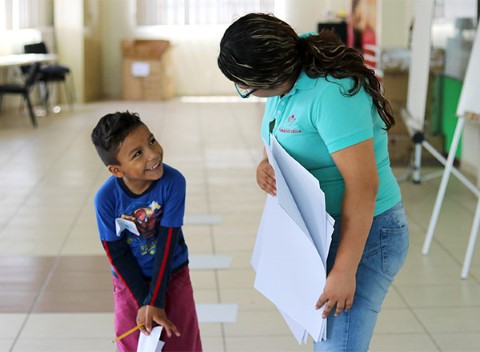- Thought Leadership

Children growing up in poverty face adversity, stress and hardship daily. The demands can hinder their brain development and result in long-term consequences on their physical and mental well-being. Without treatment, mental health issues can make it even harder for kids to escape poverty.
The good news is that if we reach kids early and build their resilience, we can help them learn to grow within the difficulties they’re up against. Then, we have a fighting chance of helping them break the cycle of poverty. At Children International (CI), a global humanitarian organization I am proud to lead, we are facing the complex issue of mental health head on. We serve more than 200,000 children living in poverty in 10 countries. In 2018, we increased the number of kids receiving a mental health intervention (prevention or treatment) by 122%. We know there is still more to do to meet demand.
Using a resilience curriculum developed by our partner Turning Point: A Community Resource of The University of Kansas Health System, CI staff and volunteers are teaching kids the 10 facets of resilience, which include calming and caring for themselves, staying optimistic and seeking out social support. It is a powerful and engaging curriculum that allows kids to express themselves in creative ways — drawing, writing, storytelling and movement, to name a few.
CI first tested the resilience curriculum late in 2017 in Mexico, where mental health is recognized as a priority health issue. In 2018, we rolled it out for more than 2,000 CI children and youth in two locations — Jalisco, Mexico, focusing on children ages 6 to 12, and in Kolkata, India, for youth ages 12 to 18.
Without question, even after a relatively short period of time, we’ve seen that the program is improving the mental health of our children and youth. By practicing resilient behaviors on a daily basis, children can think more clearly, concentrate more easily, feel more in control of their lives and recover quickly.

Caregivers testing the curriculum reported children had less anxiety and depression after completing the course.
The resilience program is being used this summer to help children living worlds apart in distance but connected in the struggles life presents. Turning Point will hold resilience-focused summer camps in Kansas City to help local children learning to cope when a family member is ill. Our CI children in Mexico and India will also attend resilience programs this summer, engaging in some of the same activities to help them develop a strong mental health foundation. I can imagine all of these children — in three different parts of the world — working to realize their full potential, and I am inspired for the future! This is the power of partnerships and coming together for good.
Let me tell you the story of Valeria, an 11-year-old girl in our program in Jalisco. Before she came to CI, Valeria couldn’t control her anger. Her mother tells the story of the day a teacher called with the troubling news that in a fit of rage Valeria had thrown a large rock at an adult passerby. Unable to afford psychological help, the desperate mother inquired about the resilience program at CI and registered Valeria for a workshop: “A journey through colors, emotions and art.” There, she learned to understand her emotions, how to express them and techniques for handling difficult situations. Today, Valeria is still working with a CI psychologist, and her mother says she is a changed girl — a girl who no longer explodes or hits her sisters. Instead, she seeks out calming tools when feeling angry. It is most impressive to me that this young girl made the commitment to change behaviors she knows can affect her life and her interactions with others.
Although CI teaches all 10 facets of resilience through the Turning Point, curriculum, we measured three in our Mexico and India pilots: self-care, identifying emotions and self-calming. Take a look at some of the positive results our staff, kids and caregivers reported:

Kids participate in an activity teaching them self-calming skills.
At CI our vision is to bring people together to end poverty for good. To realize that vision, we are looking directly at the complex issue of mental health and working to develop mentally healthy kids who can find a path out of poverty.
We are grateful to Turning Point for partnering with us to do this important work. In fact, Children International is fortunate to have many committed and passionate partners: Other nongovernmental organizations, private-sector businesses, governmental agencies, supporters, staff and volunteers. Together, we combine strengths, assets, passions, resources and expertise to invest in children and youth for the first two decades of their lives, break generational cycles, and end poverty … for good.
Find more information about Children International and health programs delivering positive outcomes for kids working to escape the generational cycle of poverty on our website.
Comments
You must be logged in to comment. If you have an account, click here to log in.